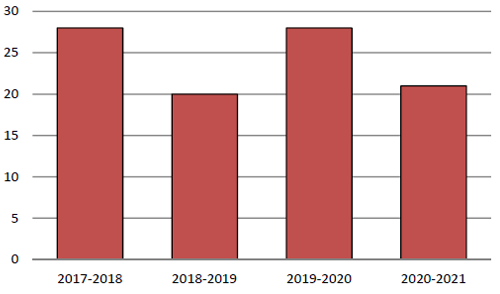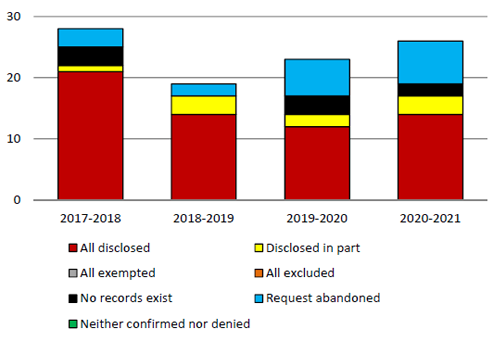Statistical Report on Requests under the Privacy Act – Annual Report on the Privacy Act for the period ending March 31, 2021
This section provides an interpretation of several statistics on the processing of requests made to the Office of the Chief Electoral Officer under the Act. All figures and data for the 2020-2021 fiscal year are provided in the attached statistical report (see Appendix II).
3.1. Number of requests
The Office of the Chief Electoral Officer received 21 formal requests for personal information during 2020-2021, a 25 percent decrease from the previous year when 28 formal requests were received. Twenty-six requests were processed during the reporting period and three requests were carried over into the new fiscal year.
Received during reporting period

Text version of "Received during reporting period"
Received during reporting period
This bar graph is titled "Received during reporting period." It shows the number of requests received for the past 4 fiscal years.
- In 2017-2018, 28 requests
- In 2018-2019, 20 requests
- In 2019-2020, 28 requests
- In 2020-2021, 21 requests
The Office of the Chief Electoral Officer did not receive any consultations from other institutions during the reporting period.
3.2. Disposition of completed requests
Of the 26 requests completed during the reporting period, 14 resulted in full disclosure of the information requested. This represents 54 percent of all completed requests, a slight increase from the previous fiscal year during which 52 percent resulted in full disclosure. Three requests resulted in partial disclosure, where personal information of individuals unassociated with the request was exempted further to section 26 of the Act. Records did not exist for 2 requests and 7 requests were abandoned by the applicants.
Number and Disposition of Completed Requests

Text version of "Number and Disposition of Completed Requests"
Number and Disposition of Completed Requests
This bar graph is titled "Number and Disposition of Completed Requests." It shows the extent to which requested records were disclosed in the past 4 fiscal years.
In 2017-2018:
- All disclosed, 21 requests
- Disclosed in part, 1 request
- No records exist, 3 requests
- Request abandoned, 3 requests
In 2018-2019:
- All disclosed, 14 requests
- Disclosed in part, 3 requests
- Request abandoned, 2 requests
In 2019-2020:
- All disclosed, 12 requests
- Disclosed in part, 2 requests
- No records exist, 3 requests
- Request abandoned, 6 requests
In 2020-2021:
- All disclosed, 14 requests
- Disclosed in part, 3 requests
- No records exist, 2 requests
- Request abandoned, 7 requests
3.3. Completion time of requests
In 2020-2021, a total of 17 requests (65 percent) were completed within 30 days, compared to 87 percent in 2019-2020 when 20 requests were completed. Eighty-one percent (21) of the requests were completed within legislated timelines. The Office of the Chief Electoral Officer has historically received simple privacy requests that are uncomplicated to process, primarily requests for information from the National Register of Electors. However, 9 requests closed in 2020-2021 (35 percent), were more complicated and took longer to process. Six requests were closed within 31 to 60 days, one was closed within 61 to 120 days and two were closed within 121 to 180 days. The requests took longer to process largely because of workload issues or difficulties with retrieving information. Unforeseen adjustments to work processes related to COVID-19 implemented towards the end of 2019-2020, continued temporarily affect the processing of some requests under the Act. Most employees, including ATIP staff, were required to work remotely with limited access, at times, to Elections Canada's network and paper files.
3.4. Disclosures of personal information under paragraph 8(2)(m)
Subsection 8(2) of the Act stipulates that a government institution may disclose personal information under its control without the consent of those whom the information relates. Such disclosures are discretionary and are subject to any other act of Parliament.
Paragraph 8(2)(m) allows an institution to disclose personal information for any purpose where, in the opinion of the head of the institution, the public interest in the disclosure clearly outweighs any invasion of privacy that could result from it or where the disclosure would clearly benefit the individual to whom the information relates.
The Office of the Chief Electoral made one disclosure pursuant to paragraph 8(2)(m) in the 2020- 2021 fiscal year. The name, address and unique client identifier of 24,594 individuals were disclosed to Immigration, Refugees and Citizenship Canada, so they could send required notifications to the individuals. The Office of the Privacy Commissioner of Canada was notified further to subsection 8(5) of the Act, prior to the disclosure of the information.
3.5. Fees and Costs
There is no charge to individuals for processing requests under the Act.
During this reporting period, the ATIP Office expended $134,919 to administer the Act. Salaries accounted for $84,626 of this total, whereas spending on goods and services amounted to $50,293.
